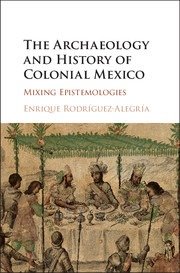
The archaeology and history of colonial Mexico: mixing epistemologies
This is an archaeological and historical study of Mexico City and Xaltocan, focusing on the early years after the Spanish conquest of the Aztec empire in 1521. The study of households excavated in Mexico City and the probate inventories of 39 colonizers provide a vivid view of the material and social lives of the Spanish in what was once the capital of the Aztec empire. Decades of archaeological and ethnohistorical research in Xaltocan, a town north of Mexico City, offers a long-term perspective of daily life, technology, the economy, and the adoption of Spanish material culture among indigenous people. Through these case studies, this book examines interpretive strategies used when working with historical documents and archaeological data. Focusing on the use of metaphors to guide interpretation, this volume explores the possibilities for interdisciplinary collaboration between historians, archaeologists, and anthropologists working on this pivotal period in Latin American history.
* Compares daily life among Spanish colonizers in Mexico City and indigenous people in Xaltocan, focusing especially on cross-cultural adoption of material culture
* Provides unpublished data from the probate inventories of 39 Spanish colonizers, as well as archaeological data from Xaltocan
* Offers an original comparison of interpretive strategies in history and archaeology, focusing on the use of metaphors to go from evidence to narratives about the past
Cambridge University Press
Cambridge MA
